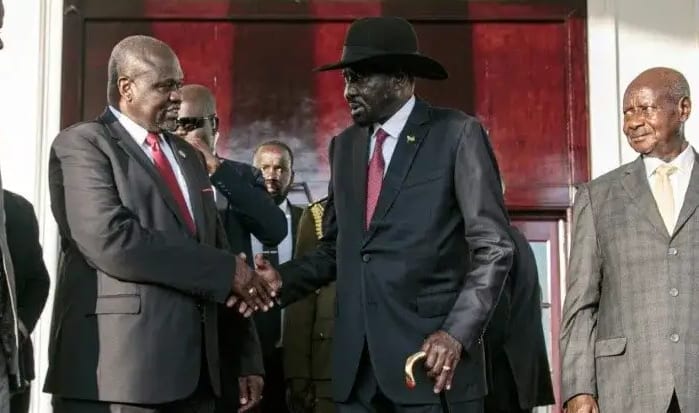Last updated on September 11th, 2021 at 03:03 pm
SOUTH SUDAN President Salva Kiir and rebel leader Riek Machar agreed on Thursday to form a unity government, a long-delayed step towards ending more than six years of war.
The rivals have overseen a conflict that has left at least 380,000 dead and forced four million from their homes.
“We have agreed to form the government in two days on 22nd February.
We are still discussing on other things and I am hopeful we will resolve them all,” Machar said after meeting Kiir.
The president confirmed that they had agreed to a joint government for the third time since independence in 2011 — an experiment which has ended in disaster twice before.
“As the president, I will be appointing the vice presidents, and I will start by appointing Riek tomorrow (Friday) in the morning and I will dissolve the government today and then form a new government on the 22nd,” he said.
“These are changes which will bring peace.”
The formation of a unity government was the cornerstone of a September 2018 peace deal.
But it has been delayed twice by failure to move forward on crucial issues such as forming a unified army, carving out state borders and creating a protection force to assure Machar’s security.
Kiir said his forces would be in charge of Machar’s protection and of security in Juba.
“I have taken responsibility of protection, as the unified forces are still under training,” he said.
He urged some 190,000 people living under United Nations protection in tent cities across the nation “to come out, because the dawn of peace has come”.
The progress came after weeks of mounting pressure from the region and the United States, which on Thursday welcomed the deal, citing Machar’s “firm commitment to form an inclusive unity government” by Saturday.
– ‘Deliberately starving’ civilians –
Machar was sacked as vice president in 2013 and later accused of plotting a coup against Kiir, kickstarting a civil war characterised by violence, rape and UN warnings of ethnic cleansing.
A 2015 peace deal brought Machar back as vice president and he returned to Juba with heavy security.
When the deal fell apart in July 2016, the capital was plunged into a brutal battle between their rival armies and Machar was forced to flee on foot.
The ensuing war drew in new parts of the country and other local grievances and disputes came to the fore.
Experts have warned against rushing into a new unity government before all the outstanding issues are resolved, saying it could lead to disaster once again.

